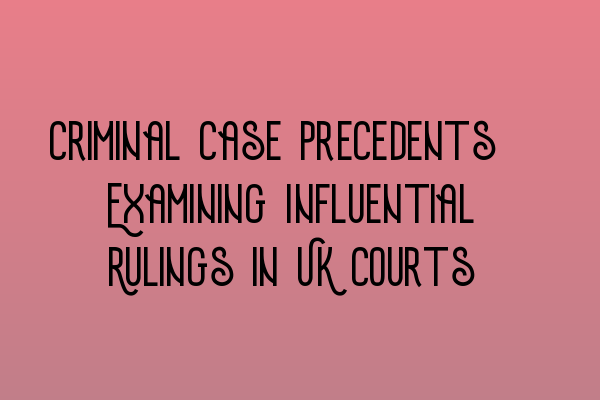Criminal Case Precedents: Examining Influential Rulings in UK Courts
Welcome to the SQE Criminal Law & Practice Law UK blog! In this post, we will explore the fascinating world of criminal case precedents in the UK courts. Criminal case precedents play a crucial role in shaping the legal landscape, influencing subsequent rulings and setting legal standards that guide practitioners and judges alike.
If you’re preparing for the SQE 1 exam, it’s essential to have a solid understanding of criminal case precedents. It is not only a topic that may appear in the exam, but it also demonstrates your knowledge and ability to apply legal principles in practice. Familiarity with influential rulings can strengthen your arguments and help you navigate complex legal scenarios.
What are Criminal Case Precedents?
Criminal case precedents refer to past court decisions that serve as legal authority for similar future cases. When a court encounters a new case, the judge will carefully examine relevant precedents to determine the appropriate legal principles and rules that apply to the situation at hand.
These precedents can come from various sources, including higher courts such as the Supreme Court or the Court of Appeal. The decisions made in these courts carry significant weight and are highly influential in shaping the law in the UK.
Why are Criminal Case Precedents Important?
Examining criminal case precedents is crucial for several reasons:
- Consistency: Precedents promote consistency in the justice system. They ensure that similar cases are treated similarly, providing predictability and fairness to both legal practitioners and the public.
- Interpretation of the law: Precedents help interpret statutes, ensuring that laws are applied correctly and their intended meaning is upheld.
- Guidance for legal arguments: Precedents offer a valuable roadmap for constructing persuasive legal arguments. By studying past rulings, you can craft stronger arguments and support your position with authoritative legal reasoning.
Examining Influential Criminal Case Precedents
Now let’s delve into some influential criminal case precedents in the UK courts:
1. R v Brown (1993)
The case of “R v Brown” involved a group of adults engaging in consensual sadomasochistic activities. This ruling clarified the limits of consent in certain situations and set precedents regarding acts that may be considered unlawful, even with consent. To understand the legal implications of this case in detail, refer to our article on SQE 1 Practice Exam Questions.
2. R v Jogee (2016)
“R v Jogee” was a landmark case that reviewed the law on joint enterprise. The ruling clarified the test for foresight, emphasizing the need for direct intention to commit an offense. This case brought significant changes to the interpretation and application of joint enterprise law in the UK. For further insights into joint enterprise, check out our article on SQE 1 Practice Mocks FLK1 FLK2.
3. R v Cunningham (1957)
In the case of “R v Cunningham,” the court established an important principle in criminal law, known as the Cunningham recklessness test. This precedent clarified the mens rea requirement of reckless behavior. To delve deeper into the concept of recklessness, refer to our article on SQE 2 Preparation Courses.
Staying Updated with Criminal Case Precedents
Keeping up with criminal case precedents is essential for any aspiring or practicing criminal law professional. It demonstrates your commitment to staying informed about developments in the legal field and enhances your ability to provide effective legal representation.
If you’re preparing for the SQE 1 or SQE 2 exams, consider enrolling in our comprehensive SQE 1 Preparation Courses or exploring our educational resources for SQE exam dates, practice questions, and more on our website.
Stay tuned to our blog for more informative articles on criminal law, legal practice, and essential topics for SQE candidates.
